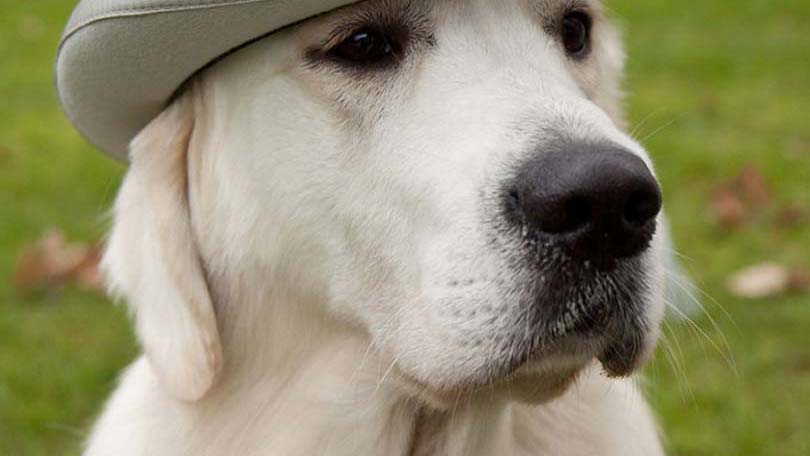
Run your hands along the sides of your dog- can you feel his ribs? Does your dog have a obvious “waist”- a narrowing of their width behind the ribcage? If you answered “no” to either of these questions, then there is a good chance that your dog is one of the estimated 40% of all dogs suffering from being overweight or obese. Being overweight can have an array of adverse health consequences for your dog, and prompt attention to your dogs physical condition is the first step in curbing the epidemic of overweight dogs.
Dogs become overweight for the same general reasons as their owners- their calorie intake is greater than what they burn off in a day, and those excess calories are converted into fat. Unfortunately, the biggest culprit in making a dog overweight is usually those who love him most, and easily give in to begging for food and treats in addition to their regular food.
Most commercially available dog food is meant to be a complete food – meaning that when fed alone, it will provide the dogs complete nutritional needs. So what happens when you feed that complete food, along with treats and table scraps? Your dog is now receiving a far greater amount of calories than their daily requirement. Treats should make up no more than 10% of your dogs total diet, and their food intake should be adjusted accordingly for the amount of treats they typically receive.
Along with higher calorie intake, lack of activity plays a significant role in the prevalence of overweight dogs. Our increasingly busy lifestyles make it more difficult to find time to go out for a nightly walk or to spend an hour at the park, and excess calories are not being burned off as readily. In addition to exercise, as dogs age their metabolism typically slows down, brining their caloric needs down as well.
Although the cause of most obesity is generally attributable to overfeeding and lack of exercise, there are several health problems which can cause dogs to become overweight, such as hypothyroidism. It is important to consult with your veterinarian on your overweight dog, as simple blood tests can rule out this and other medical conditions that could be contributing to your dogs weight, and treating these underlying conditions will greatly improve your dogs health and chances of success in a weight loss program.
Being overweight also causes an array of serious health problems to dogs, and can affect every major part of their body. Overweight dogs have added stress on their joints, bones and muscles from carrying around extra weight. This can cause muscle and ligament strains and tears, joint deterioration, and rapidly developing arthritis. Dogs with a predisposition to orthopedic problems, such as elbow and hip dysplasia or back problems, are at a especially greater risk of having more rapid and severe complications as a result of being overweight.
Being overweight also predisposes dogs to an array of problems to your dogs major organs. Obesity requires that the heart work harder to pump blood to the body, and can cause high blood pressure, and congestive heart failure. Additional fat in the chest can restrict the expansion of lungs, causing difficulty breathing. Being overweight requires more effort from the heart, muscles and respiratory systems to perform their basic functions, leading to decreased endurance and stamina. Excessive amounts of fat building up in the liver can lead to decreased liver function and even failure.
Diabetes mellitus is a growing problem being seen in overweight dogs. Obesity causes an increase in insulin production in the dog, which over time can deplete the bodies ability to produce insulin, causing diabetes.
In addition, skin and hair problems, digestive problems, and even an increased risk of cancer are all potential side effects of being overweight, all ultimately contributing to a decreased quality and length of life.
An exam with your veterinarian should be performed prior to starting any kind of weight loss program with your dog. Along with ruling out any medical causes of obesity, your vet can help design a program that both you and your dog can live with, determine a target weight and provide valuable suggestions and support in helping you slim down your canine companion.
When it comes to reducing caloric intake, in some cases a simple reduction in the amount of food that your dog gets might be sufficient to being about weight loss. In more severe cases, a prescription weight loss diet might be recommended to help ensure calorie restriction. Feeding your pet smaller meals, several times a day will help keep him from feeling like he is being denied, as well as keep his metabolism working all day long.
While cutting calories in your dogs food, make sure that everyone in the household is on board with the diet plan. Nothing is more frustrating than having your dog on a diet and not having any success- only to find out that someone in the house is “sneaking” him treats and food on the sly! The amount of dog treats needs to be reduced as well, and if possible, replaced with low calorie treats.
Along with diet reduction, exercise is a cornerstone to helping your dog loose weight. For the previously couch-bound dog, suddenly starting a vigorous exercise program can have many adverse health affects, so instead begin an exercise program with short, easy walks, only increasing in time and energy as the pets own activity level dictates. Once you and your dog get into the habit of a daily exercise regime, you may find that you are both looking forward to, and benefiting from it!
It is important to remember that rapid weight loss is almost as damaging to your dog as being overweight was in the first place- the goal of any diet program should be slow, steady weight loss with gradually improving health. Periodic rechecks with your vet will help to keep the goal in sight, and determine when your pet has reached his optimum weight.
Once your dog has reached his ideal weight, the struggle is not over! After all, gaining the weight is always much easier than loosing it. Make a conscious effort to continue the exercise program you have been working on, and continued monitoring of your dogs weight will help to ensure that he isn’t creeping upwards on the scale again.
Overweight dogs suffer from an array of serious and debilitating health conditions, as well as decreased life expectancy and quality of life. Through medical care, diligence, careful diet considerations and an exercise program, you can help your dog achieve his ideal weight and live a longer, happier life.





